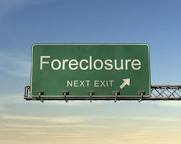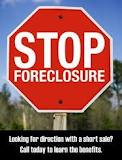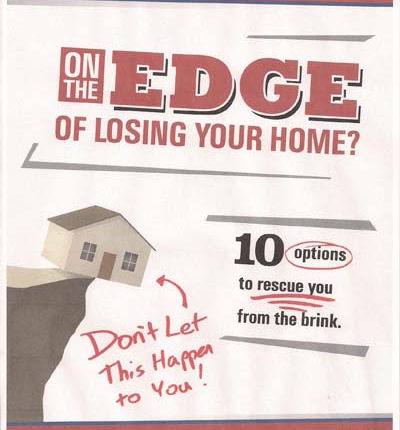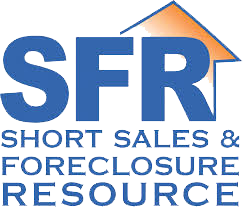Options Available
Foreclosure
Repayment Plan / ForbearanceAn option like a repayment plan, also called a forbearance, is designed to allow the homeowner to pay back delinquent mortgage payments over a certain amount of time. Forbearance are best successful in a situation when a borrowers hardship was only temporary, and they are already on the road to complete financial recovery. If the hardship is still not completely resolved at the time the borrower enters into the forbearance, it is typically only a temporary fix to a financial problem. Loan ModificationsAnother option for the homeowner who wants to avoid a foreclosure might be a mortgage modification. A mortgage modification can do one of the following; change the principal balance of the loan, the length of the loan, or the interest rate. When opting to try a mortgage modification, it is good to know that the homeowner can be in default, in foreclosure, in bankruptcy, late, or current at the time the application for a mortgage modification is made. Actual principle reductions in the mortgage balance are extremely rare and occur in less than 1% all loan modifications, with the vast majority of loan modifications still leaving borrowers still in a negative equity position. Most successful loan modifications will usually bring the homeowners mortgage payments down but prolonging the loan term. Historically, loan modifications are offered as a temporary solution to borrowers, similar to putting a band-aide on a hemorrhage. In most cases they only prolong the inevitable downward path that financial hardship brings. In recent years, many loan modifications have become good permanent solutions to borrowers whose hardship is temporary and who can easily afford a slightly lower payment. Deed In Lieu of ForeclosureA deed in lieu of foreclosure is an option that
can be available to a homeowner BankruptcyBankruptcy has been a considered option for homeowners who want to stop foreclosure, however; only in some states and situations can a bankruptcy be a foreclosure solution. Bankruptcy will not stop the foreclosure process but simply delay it if a homeowner cannot afford to continue with their mortgage payments. Filing for bankruptcy during a foreclosure can result in a damaged credit score, can be expensive and can only be filed once every seven years. A bankruptcy can not only effect a borrowers current and future employment in many fields, but will also scar a borrowers credit for many years to come. While a bankruptcy may seem like an easy way out, it should only be used as a last resort. Short SaleA more common method to avoid foreclosure has been
to do a short sale. A short sale is for the homeowner
who has encountered a financial hardship that has
caused them to be late on mortgage payments or
for the homeowner who foresees their hardship taking
a toll on their ability to pay their mortgage in
the future. In a short sale the lender will take
a lesser pay off than what they are owed once the
home is sold. This is not done as a favor to the
borrower, but only for the lender to also avoid
expensive foreclosure expenses and minimize future
loss. A short sale will allow the homeowner to
stop foreclosure and save the huge impact a foreclosure
would have on their It is important for homeowners to understand that they do have options available to avoid foreclosure and should immediately seek the guidance of a local short sale specialist or housing counselor as soon as they start to realize their financial situation could take a toll on their place of living. Contact us for no cost assistance and guidance during your time of greatest need. Seek legal advise and representation in all legal matters. WeLocate Real Estate is not affiliated with the government and its services may not be approved by your lender. We do not recommend that you stop paying your mortgage. Even if you use our services, your lender may not agree to change the terms of your loan or accept a short sale. |
Jennie Shook
Finding
The Right Solution
|
WeLocate Real Estate
 |
853 Dunivin Ln. Ste C Dewey, AZ 86327 (928) 237-5750 Office (928) 237-5858 FAX Jennie Shook, Broker jennie@jennieshook.com (928) 458-9453 cell |
 |
 The
housing crisis has caused a great deal of stress
to homeowners in hardship, and has pushed more
than one out of every seven of them into the path
of foreclosure. Options have been made available
to homeowners trying to avoid foreclosure; options
like repayment, mortgage modification, deed in
lieu of foreclosure, Bankruptcy, and short sale.
In this article we will take a look at these different
options available to home owners who are in financial
hardship.
The
housing crisis has caused a great deal of stress
to homeowners in hardship, and has pushed more
than one out of every seven of them into the path
of foreclosure. Options have been made available
to homeowners trying to avoid foreclosure; options
like repayment, mortgage modification, deed in
lieu of foreclosure, Bankruptcy, and short sale.
In this article we will take a look at these different
options available to home owners who are in financial
hardship. While
foreclosure should not be an option for most borrowers
in hardship, it is the inevitable outcome if action
is not taken. A foreclosure simply destroys a home
owners credit and will make it impossible for a
borrower to qualify for most loans in at least
five years or more. In addition and perhaps most
importantly, after a foreclosure, a borrower is
still liable for the original amount they owe their
lender in many cases. This means that in most states,
lenders can come after a defaulted borrowers vehicles
and other assets years after a foreclosure is completed.
While foreclosure can seem like the easy and simple
solution, it can also be the most costly to all
parties.
While
foreclosure should not be an option for most borrowers
in hardship, it is the inevitable outcome if action
is not taken. A foreclosure simply destroys a home
owners credit and will make it impossible for a
borrower to qualify for most loans in at least
five years or more. In addition and perhaps most
importantly, after a foreclosure, a borrower is
still liable for the original amount they owe their
lender in many cases. This means that in most states,
lenders can come after a defaulted borrowers vehicles
and other assets years after a foreclosure is completed.
While foreclosure can seem like the easy and simple
solution, it can also be the most costly to all
parties. in
default that is already in foreclosure proceedings.
This this option can allow the homeowner to deed
back title to their home to their lender prior
rather than continue with the foreclosure process.
Lenders will benefit from a deed in lieu because
they will not have to invest more time and capital
resources in the foreclosure process and dealing
with potentially vandalized property should the
home sit for a long time after the foreclosure
process. While this may seem like a good option
to many home owners in hardship in order to "wash
their hands" of the situation, there can still
be severe penalties. In most cases, the borrower
is still completely liable for the deficiency (loan
balance less proceeds from final property sale),
and their lender can and will pursue collections
years up the road. In addition, the impact to a
borrowers credit and ability to purchase a property
again in the future is nearly identical to a foreclosure.
in
default that is already in foreclosure proceedings.
This this option can allow the homeowner to deed
back title to their home to their lender prior
rather than continue with the foreclosure process.
Lenders will benefit from a deed in lieu because
they will not have to invest more time and capital
resources in the foreclosure process and dealing
with potentially vandalized property should the
home sit for a long time after the foreclosure
process. While this may seem like a good option
to many home owners in hardship in order to "wash
their hands" of the situation, there can still
be severe penalties. In most cases, the borrower
is still completely liable for the deficiency (loan
balance less proceeds from final property sale),
and their lender can and will pursue collections
years up the road. In addition, the impact to a
borrowers credit and ability to purchase a property
again in the future is nearly identical to a foreclosure. credit.
A short sale will typically recover from a homeowner's
credit in a short period of time and leave them
eligible to purchase a home again in only to years.
In addition, in most cases the lenders will completely
forgive the borrower of any deficiency or short
fall in the money that they were originally owed.
Lenders are so motivated to cut their losses with
a short sale, there are also many cash back incentives
offered to borrowers to complete a short sale.
credit.
A short sale will typically recover from a homeowner's
credit in a short period of time and leave them
eligible to purchase a home again in only to years.
In addition, in most cases the lenders will completely
forgive the borrower of any deficiency or short
fall in the money that they were originally owed.
Lenders are so motivated to cut their losses with
a short sale, there are also many cash back incentives
offered to borrowers to complete a short sale.








